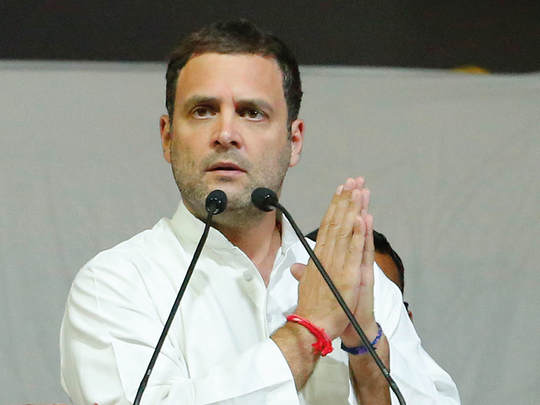NEW DELHI: Rahul Gandhi continues to ignite separatist sentiments in J&K by opposing outside investments and business contracts in the region.
An old friend from Lucknow called and asked an interesting question, “Tell me, does the road to power in India’s Central government go through UP (Uttar Pradesh) or USA (America)?” He has been a senior official, leader, and writer, witnessing the rise and fall of governments and political parties, from Charan Singh to Yogi Adityanath and Indira Gandhi to Narendra Modi. I responded, “Traditionally, major political leaders have always claimed that without launching a victorious campaign from Uttar Pradesh, no one has become or helped make a Prime Minister. But now, some leaders of Congress, which once blamed the CIA for disruptions, believe that American influence can ease the path to power. This might be why, before every Lok Sabha or major state election, arrangements are made for Rahul Gandhi to visit the USA.”
From this brief conversation it became clear that this is no coincidence, nor purely political; it is becoming an important game of international power. There’s an ongoing effort to influence Indian politics, administration, economy, media, and intelligence networks. This time, the Congress is going all out, from sensitive Jammu and Kashmir to Maharashtra’s Mumbai, a global financial hub, as they gear up for elections.
Rahul Gandhi will be in the USA from September 8 to 10, where he will engage with people at Georgetown University and the University of Texas, and hold meetings in Washington DC and Dallas. He will interact with the press at the National Press Club, meet with think tank members, and address students and select individuals at Georgetown University. Sam Pitroda, a close family confidant of the Gandhi family who often speaks out, has described Rahul and Rajiv Gandhi as “custodians of the idea of India.” Pitroda claims Rahul is more intelligent than his father and a better strategist. In an interview with an Indian news agency in Chicago, Pitroda emphasized that Rahul Gandhi, Leader of the Opposition in the Lok Sabha, possesses all the qualities needed to become Prime Minister. After this statement, Pitroda’s campaign for Rahul continues on various TV channels and social media platforms.
Over the past decade, Rahul Gandhi has likely undertaken more than 300 foreign trips. Pitroda, who first entered the inner circle of Indira and Rajiv Gandhi through his telecom strategies, was later given significant decision-making roles in government. After Rajiv Gandhi stepped down, former Congress minister K.P. Unnikrishnan accused Pitroda of corruption in the telecom sector. An investigation was ordered, but before long, the government changed, and Congress returned to power. The ups and downs continued, and during Manmohan Singh’s tenure, Pitroda was appointed head of the Knowledge Commission under Sonia Gandhi’s National Advisory Council, a position almost equivalent to a minister’s. Now, he is a close advisor to Rahul Gandhi, assisting with foreign trips and helping draft election manifestos.
When asked about the differences between Rajiv and Rahul Gandhi, Pitroda said, “I have worked closely with several Prime Ministers, including Rajiv Gandhi, P.V. Narasimha Rao, Manmohan Singh, V.P. Singh, Chandra Shekhar, and H.D. Deve Gowda. However, the difference between Rajiv and Rahul is that Rahul is more intelligent and a better strategist, while Rajiv believed more in action.” Such claims suggest that Rahul Gandhi is trying to captivate Indian voters through his foreign activities. His other advisor, Digvijaya Singh, has gone a step further by saying that whether in power or not, staying in the news is important. Congress’ communication chief Jairam Ramesh also favours an aggressive stance, similar to that of Gandhi family loyalist Mani Shankar Aiyar. But does this really help win the hearts of the public? Figures like Pitroda, Aiyar, and Ramesh don’t contest elections themselves, but Rahul Gandhi’s statements, influenced by their advice, can be seen as dangerously misleading from a national interest perspective. Over the past year, he has made provocative statements, such as calling for a caste-based census and accusing the government of handing the national treasury to two billionaires.
Ahead of his USA trip, Rahul Gandhi even stated in election rallies in Kashmir that “Congress brought democracy to Kashmir by removing kings, but the Modi government has reinstated kings. The Lieutenant Governor is now the king here. Previously, Union Territories were elevated to statehood, but Modi has reduced states to Union Territories. The entire government is being run for two billionaires, which are now given to them.”
He will likely make similar statements in the USA, as his advisor Pitroda believes, “It is legitimate for an opposition leader to criticize the government, and that’s their job, so why complain? Criticizing comments made abroad is nonsense.”
Prime Minister Narendra Modi’s government liberated Jammu and Kashmir from the constraints of Article 370, bringing its people the same rights as other Indians and accelerating economic development. Today, two to three crore tourists visit the region, and the government has promised to restore statehood after the elections. Yet, Rahul Gandhi continues to ignite separatist sentiments by opposing outside investments and business contracts in the region. Under the corrupt rule of the Abdullah and Mufti families, Kashmir was deeply affected by terrorism and limited resources. Large-scale investments from within and outside India are essential for infrastructure development, tourism, employment, and business. Shouldn’t Kashmiris also have the right to work and do business in places like Rae Bareli, Amethi, Uttar Pradesh, Bihar, Karnataka, and Himachal Pradesh? And can any Lieutenant Governor or Governor act like a king during President’s Rule? Even Indira Gandhi’s security officials and Rahul Gandhi have held the same positions, but no opposition leader made such accusations.
Similarly, how justifiable or beneficial is it to claim, both in India and abroad, that Indian democracy and justice are entirely in crisis

